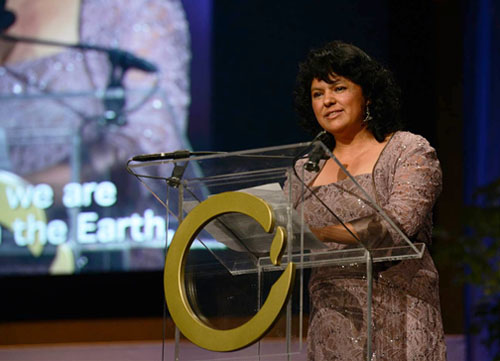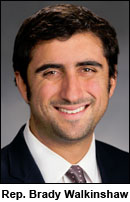OPINION
Murder of Berta Cáceres part of tragic pattern in Honduras
By REP. BRADY WALKINSHAW
(Mar. 4, 2016) — The assassination of Berta Cáceres, the widely acclaimed Honduran indigenous and environmental rights leader, comes less than a week after she was threatened for opposing a hydroelectric project. Her murder is part of a tragic pattern with over 100 human rights campaigners killed since 2010 in Honduras. This past summer, Cáceres visited Seattle with El Centro de la Raza.
 I woke up to emails Thursday morning from friends and activists in Honduras mourning her death. I’ve spent time working in rural community centers in La Esperanza, a heavily indigenous region in western Honduras, with some of the highest rates of rural poverty and malnutrition in the country, where Cáceres began her environmental and human rights advocacy.
I woke up to emails Thursday morning from friends and activists in Honduras mourning her death. I’ve spent time working in rural community centers in La Esperanza, a heavily indigenous region in western Honduras, with some of the highest rates of rural poverty and malnutrition in the country, where Cáceres began her environmental and human rights advocacy.
Cáceres co-founded Council of Indigenous Peoples of Honduras (COPINH) with Tomás García who was shot by a military officer in 2013. She was under the protection of human rights organizations and was a deeply respected environmental leader in the country. The tragedy is another attack on human rights, and we’ve witnessed a rising number of tragedies perpetrated against indigenous, LGBT leaders, and human rights leaders in Honduras in recent years.
I spent a formative part of my life living and working for social justice in Honduras. My work was in Colonia Villanueva, an urban slum on the outskirts of the country’s capital, Tegucigalpa. Today, it is a slum of nearly 100,000 that started as a squatters’ settlement in the 1980s and grew into one of the single largest concentrations of poverty and violence in the country. I worked on youth leadership programs in schools where fewer than 40 percent of kids finished 6th grade.
I’ve watched with deep sadness over the past 10 years as violence and human rights violations have escalated, and as the country struggles time and again to build peace within its own borders. Our U.S. foreign policy in the region leaves a deeply troubling legacy. The wars in the 1980s in El Salvador and Nicaragua to advance misguided U.S. foreign interests were supported from within Honduras. I grew up with my parents actively involved in the Sanctuary Movement to help immigrants fleeing these wars find political asylum in Canada.
Our policies in Honduras have not helped. In fact, our actions have further destabilized the country, whether through DEA actions in La Mosquitia region, leading to the deaths of innocent Honduran civilians, to our role in the 2009 transition of government. A few years ago, I asked a classroom full of students in a poor urban school in Tegucigalpa, how many of them aspired to immigrate to the United States? Three quarters of the kids in the room raised their hands. My mom, a migrant education teacher in Nooksack Valley Schools in Whatcom County sees the impacts of this every day with the arrival of kids in her classroom fleeing the violence and instability in Honduras, Guatemala, and El Salvador. Our foreign policies at home have consequences abroad that affect our own communities in Washington state.
In Congress, I will resolutely stand for a U.S. foreign policy and foreign assistance in Central America that places human rights and environment first. These are issues I know well from a career spent working in places where our U.S. foreign assistance has not always prioritized human rights.
The tragic murder of Berta Cáceres should not be in vain. I hope that Honduran leaders will do everything within their power to ensure a fair, impartial, and thorough investigation, which prosecutes those responsible and brings justice to Berta Cáceres’ memory.
 Brady Piñero Walkinshaw is a Democratic State Representative representing the 43rd Legislative District, which encompasses much of central Seattle. This year, he is running for Congress in the 7th Congressional District.
Brady Piñero Walkinshaw is a Democratic State Representative representing the 43rd Legislative District, which encompasses much of central Seattle. This year, he is running for Congress in the 7th Congressional District.





